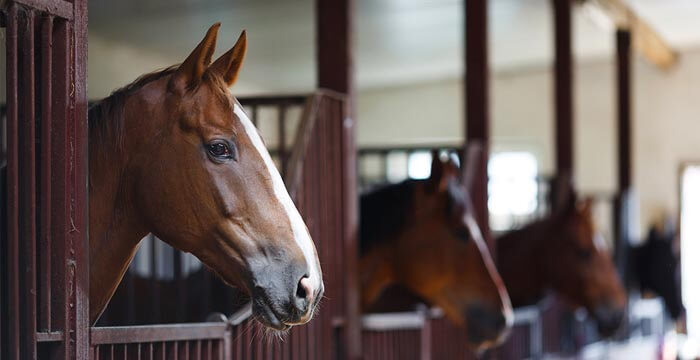With the shell of my new barn complete and the notion of moving horses in over the next couple of months becoming more real, I’ve been working to get all my ducks in a row. Over the years I’ve carried a variety of different trainer’s and equine mortality insurance, but I admittedly was a bit naive about insurance in general. I’ve become more knowledgeable about homeowner’s insurance as a Realtor, but I still wasn’t quite sure what I would need to protect my assets once the horses move in.
In talking with Rob Knode from Insurance Services Group about my project, I realized that this topic would benefit most horse property owners. I asked him to answer a few questions that I could share with The Northwest Horse Source readers.
What’s the difference between a homeowner’s policy and a hobby farm policy, and how do I know what I need?
Many standard insurance carriers write farm policies. With a traditional homeowner’s policy there’s a formula that automatically gives a limit to structures other than the residence. With a farm policy, each building is given a specific, agreed-upon value and is described on the declarations page of the policy. Most homeowner’s policies can be quoted with an address, information on the county assessor’s page and combined with owner information on updates and history of any losses.
A homeowner’s policy does not contemplate any public activity on the premises. Business activity may not be excluded, but there would never be a homeowner’s policy that would defend or respond to a business incident on the same premise without specifically agreeing to this on the policy. Typically, this would require a separate commercial policy.
A hobby farm policy will often cover some incidental farm stands and may also allow some boarding of horses, but each carrier has their own standards. As a general rule, one horse per person on the farm is allowed, but as horse numbers rise, the carrier will consider the potential of business activity. A friend’s horse is usually acceptable, but if there is a signed contract for boarding, it’s probably time to contemplate an equine facility policy.
A major difference between homeowner’s and farm policies is the treatment of equipment and vehicles. While a homeowner’s policy will cover a small riding lawnmower, it does not contemplate a large tractor and attachments. A farm policy easily handles tractors and other similar equipment. Farms often have vehicles predominantly used on the farm. The farm auto policy has more flexible options and may provide a vehicle insurance rating that is less expensive than a standard personal auto policy, including the option to “lay-up” or suspend some coverage during the period of the year when it’s not in use.
What does the application process entail?
For best pricing and thorough coverage, a good application is mandatory. The most important information is on the property itself. Often, an appraisal will have much of this information, but the main tasks are to identify each building, its age, construction, and any amenities such as heat, electrical, plumbing, and age of the roof. Pictures are helpful, as is a diagram of the property, noting the location and size of each building.
The primary dwelling will often have a replacement cost estimate while each separate building can be noted with an agreed amount valuation. I often find that a good contractor or Realtor can give solid estimates of value, either as-is or cost to replace. If outbuildings are newer, we sometimes get a replacement cost limit by selecting the right insurance carriers.
Finding an insurance agent who is a good communicator is key to a painless, informed process. Be transparent about all activities so the proper coverage is achieved.
As a horse owner, why do I need this “extra” insurance?
Asset protection is always a top consideration. As horse folks know, there is always the possibility of an accident or injury with horses, especially with non-horsey folks around. An underinsured, or improperly insured, farm owner runs the risk of full liability if an injury occurs.
Also, in many states, if someone is paid to assist with horse care (mucking stalls, turnout, feeding) there is exposure from those workers if they get hurt on the job, especially if they are minors.
There is also risk exposure from loose livestock. If a horse gets out and causes bodily injury, a farm policy can have the proper liability coverage which a homeowner’s policy would never cover. Insurance only works if the policy is properly fit to the property and the accompanying activities.
Some states have specific protection for horse owners that, at a minimum, should be clearly posted on the property. Essentially, this is a notice stating that by being on the property, an individual accepts certain equine liability exposure.
Tune in next month for commercial equestrian insurance!
A resident of Bellingham, WA, Rob Knode has over 25 years of experience in the insurance industry. Knode’s daughters are involved in 4-H giving him firsthand experience of the horse business which helps him assist in negotiating the best premiums and insurance for horse owners. www.InsuranceServicesGroup.com

Allison Trimble is a Realtor® specializing in equestrian properties, farm and ranch properties, and residential real estate. As a former horse trainer, and a current owner, breeder and non-pro competitor in cow horse and reining events, she combines her experience in the horse industry with her lifelong real estate expertise to guide her clients through the real estate process.
Learn more at www.coastalrealtywa.com

